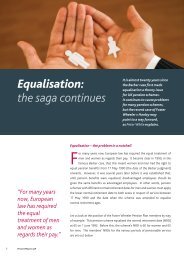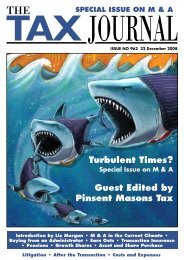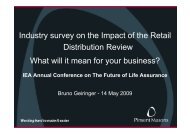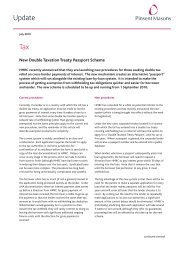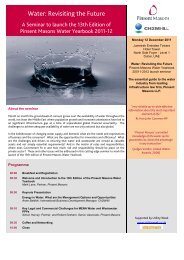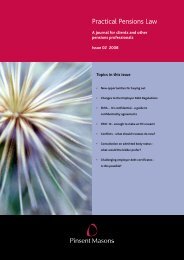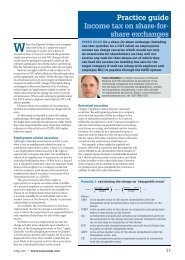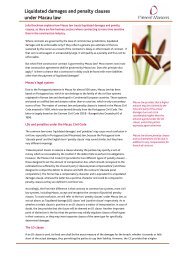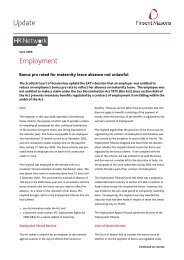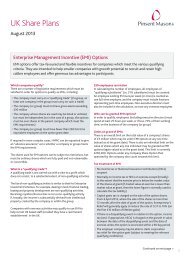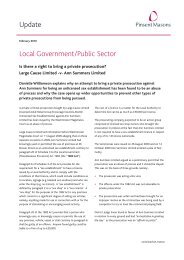Disguised Remuneration - Pinsent Masons
Disguised Remuneration - Pinsent Masons
Disguised Remuneration - Pinsent Masons
Create successful ePaper yourself
Turn your PDF publications into a flip-book with our unique Google optimized e-Paper software.
Update<br />
January 2011<br />
Employee Taxation<br />
<strong>Disguised</strong> <strong>Remuneration</strong> – the proposed new UK legislation and specifically<br />
how the new rules may impact employee incentives<br />
Draft legislation was published in the UK on 9 December 2010, setting out anti avoidance<br />
measures to tackle arrangements using trusts or other vehicles to reward employees. The<br />
arrangements will be introduced with effect from 6 April 2011, with anti-forestalling provisions<br />
applying from 9 December 2010 up to that date.<br />
The effect of the provisions will be to trigger an income tax charge when a third party (such as a<br />
trustee) makes provision for what is in substance a reward or recognition or loan in connection<br />
with the employee’s employment.<br />
In this update we have set out the basic charging regime and some of the issues that may arise.<br />
Whilst it is helpful that HMRC has confirmed it is not the intention to interfere with the operation<br />
of ordinary share plans operated on a commercial basis with no tax avoidance motive it will be<br />
necessary to follow the progress of this draft legislation to see how HMRC deals with this and the<br />
many other areas that it is thought there was no intention to catch but which are currently not<br />
excluded.<br />
Background<br />
It was announced in the March and June Budgets that the UK<br />
Government would be reviewing arrangements using trusts<br />
and other vehicles, which were intended to avoid or defer<br />
income tax (and national insurance contributions (NICs)) on<br />
employee remuneration. That review was not itself subject to<br />
a consultation process, and therefore there has been no<br />
formal engagement with taxpayers to date in relation to the<br />
operation of the proposed new rules. The draft legislation on<br />
"disguised remuneration" was published on 9 December 2010<br />
and is now subject to consultation however, with the closing<br />
date for comment on 9 February 2011.<br />
The legislation will apply in respect of any employees who are<br />
within the scope of UK income tax on relevant employment<br />
income.<br />
The legislation is intended to prevent the use of<br />
arrangements such as remuneration trusts and employerfinanced<br />
retirement benefit schemes (EFRBS) to provide<br />
benefits with tax advantages, particularly to high earners.<br />
Very broadly, EFRBS are a type of employee benefit trust<br />
(usually situated offshore, allowing tax free 'roll-up' of<br />
income and gains) which are set-up and funded by a UK<br />
resident employer. Funds are then invested by the trustees to<br />
be used to provide pensions or other benefits to the relevant<br />
employees in the future.<br />
Outline of the new rules<br />
The draft legislation has deliberately been drafted to start<br />
with a very wide net and then to exclude by specific<br />
provisions. For example, it would catch HMRC-approved<br />
share plans and registered pensions but for the specific<br />
wording which excludes these. There is no general exclusion<br />
for arrangements which are purely commercial and have no<br />
tax avoidance motive. During the consultation process it is<br />
therefore going to be necessary to review the drafting in<br />
detail and to make representations to HMRC for all the<br />
necessary exclusions.<br />
The draft legislation provides for an income tax charge (which<br />
must be accounted for by the employer and the equivalent<br />
amount recovered from the employee under the "pay as you<br />
earn" system (PAYE)) to arise broadly where there are<br />
arrangements, using a trust or other vehicle, which will result<br />
in a benefit to an employee as reward or recognition in<br />
connection with employment. This will apply in the<br />
following circumstances:<br />
continued on next page
• where a sum of money or an asset, held by a trust or<br />
other intermediary, is "earmarked" (however informally)<br />
for use as part of the arrangements. The amount of<br />
money or value of the asset will be treated as a payment<br />
of income by the employer to the employee for PAYE<br />
purposes. (Note the obligation to account for PAYE<br />
remains with the employer even though the<br />
trust/intermediary takes the relevant step in the<br />
arrangements);<br />
• where a trust/intermediary makes a payment, transfers<br />
an asset, takes a step whereby shares/securities or share<br />
options are acquired, provides a loan or grants a lease to<br />
an employee, the amount paid, or market value of the<br />
asset transferred or acquired will be treated as a payment<br />
of income by the employer to the employee for PAYE<br />
purposes. Note in relation to a loan that the full capital<br />
value of the loan, not just the amount of the benefit, will<br />
be subject to tax;<br />
• if an asset is "made available" to an employee by a<br />
trust/intermediary, for the employee to benefit from or<br />
use as if his own, then again, the value of the asset will be<br />
treated as a payment of income by the employer to the<br />
employee for PAYE purposes.<br />
Provisions will be introduced to apply NICs to these amounts.<br />
There are particular provisions in relation to tax residence and<br />
the remittance basis, which are not covered in this update.<br />
What does this mean for share plans?<br />
In relation to employee share plans, there are a number of<br />
specific exemptions - however, the draft legislation is very<br />
widely drafted and, as it currently stands, would potentially<br />
affect certain commonly used share plan arrangements where<br />
an employee trust is involved. It is common for UK listed<br />
companies to source shares for their plans through market<br />
purchase by an employee trust. HMRC has now confirmed<br />
that the new rules should not catch this type of arrangement,<br />
and further published guidance is awaited.<br />
Exemptions<br />
There are specific exemptions for any step taken under an<br />
HMRC-approved share plan (Company Share Option Plan,<br />
Share Incentive Plan or Sharesave) or an arrangement to grant<br />
options as Enterprise Management Incentives.<br />
There are also specific exemptions for the acquisition of<br />
forfeitable shares or the grant of share options. In addition,<br />
where an income tax charge arises on the lifting of<br />
restrictions, for instance, when shares cease to be subject to<br />
forfeiture, or on the exercise of a share option, the new rules<br />
will not apply.<br />
Concerns<br />
The draft legislation is very widely drafted and as it currently<br />
stands appears to catch arrangements which do not have tax<br />
avoidance as part of their aim – in other words, it catches<br />
more than just "disguised" remuneration, and extends to<br />
other remuneration which is always intended to be fully<br />
taxable. So where a trust or other intermediary is involved in<br />
the operation of a share plan arrangement, such as an LTIP or<br />
deferred bonus plan, then at present, it seems the new rules<br />
may potentially apply.<br />
For example, as noted above, UK companies commonly fund<br />
employee trusts to acquire shares in the market and the trust<br />
agrees to use those shares to satisfy awards at maturity. In<br />
such circumstances, it is always intended that the employee<br />
will be subject to income tax and NICs on maturity of the<br />
awards. However, the legislation as currently drafted, may<br />
impose a tax charge on awardholders when shares are<br />
acquired, or "earmarked" by the trust – notwithstanding that<br />
there may be conditions attached to the subsequent transfer<br />
of those shares by the trust to the awardholder.<br />
This is unintended - there could be an up-front tax charge<br />
when a share plan award (of whatever type, and whether or<br />
not subject to performance conditions) is made, just because<br />
the shares are to be sourced via an employee trust, in<br />
circumstances where there would not be such a charge if the<br />
company planned to satisfy the awards directly by issuing<br />
new shares.<br />
This would often impact upon arrangements for the deferral<br />
of bonus awards into shares – and this seems at odds with the<br />
corporate governance pressures to defer bonuses into shares<br />
and subject them to clawback conditions or "performance<br />
adjustment".<br />
Will this change?<br />
We understand that HMRC is planning to publish further<br />
guidance on the intended scope of the new rules, and hope<br />
that this will clarify the extent to which the "normal"<br />
operation of equity incentive arrangements will be affected.<br />
What does this mean for general employee<br />
taxation?<br />
Areas currently caught (but which it is believed are likely to be<br />
excluded ultimately) include many straightforward share plan<br />
arrangements (see previous section), arrangements to defer<br />
cash bonuses for regulatory reasons, arrangements put in<br />
place to protect employees from the insolvency of their<br />
employer and some overseas pension plans.
New arrangements<br />
For those employers considering any new remuneration<br />
arrangement involving a trust (or any other third party holding<br />
shares or cash or providing some benefit to staff) it would be<br />
sensible to consider whether to delay implementing such<br />
arrangements until the position is clearer. This will include all<br />
employers seeking arrangements (including EFRBS) to top up<br />
(over the new £50,000 annual allowance from 6 April) or work<br />
alongside registered pensions.<br />
Existing arrangements<br />
For those employers with an existing EFRBS or cash funded<br />
employee benefit trust - it would be best to take no new steps<br />
(so no new sub funds should be created or informal<br />
allocations made and no new loans made) until the position is<br />
clearer, including on the anti-forestalling rules. It seems that<br />
any new step under existing arrangements may be a "relevant<br />
step" for the purposes of the new rules. This includes where<br />
steps have already been taken, such as loans being made, or<br />
assets being made available.<br />
Where existing arrangements will fall foul of the new rules (as<br />
they ultimately are drafted), it may be possible to unwind<br />
these in certain circumstances without adverse consequences<br />
under the anti-forestalling rules. However, employers should<br />
not act in haste until the final form of the legislation becomes<br />
clearer.<br />
What should employers be doing?<br />
Employers using trusts in the operation and administration of<br />
share plan and other remuneration arrangements need to be<br />
aware of these new rules and their potential impact.<br />
Before the new rules take effect on 6 April, anti-forestalling<br />
rules may have effect, for example if shares are earmarked<br />
(after 9 December) within a trust for use to satisfy particular<br />
share awards. Note that if a charge arises between 9<br />
December 2010 and before 6 April under the anti-forestalling<br />
rules, this becomes due for payment on 6 April 2012.<br />
However, in straightforward situations where there is no tax<br />
avoidance intention, the current message is to "watch this<br />
space" – on the basis that HMRC did not intend to catch<br />
these situations, we hope there may be further exclusions or<br />
clarification in this area.<br />
Next steps<br />
The draft legislation is subject to consultation before it is<br />
introduced in Finance Bill 2011 in March and is likely to<br />
change between now and then in response to representations<br />
made. As mentioned above, HMRC is aware that there are<br />
some unintended consequences of the draft legislation, and<br />
will be producing further guidance to assist with companies'<br />
concerns. In the meantime, if you have any particular<br />
concerns or queries, please speak to your usual <strong>Pinsent</strong><br />
<strong>Masons</strong> contact, or to one of the team mentioned below.<br />
Who to Contact<br />
John Christian<br />
Partner<br />
DDI: 0113 294 5296<br />
M: 07831 788196<br />
E: john.christian@pinsentmasons.com<br />
Rory Cray<br />
Partner<br />
Judith Greaves<br />
Partner<br />
DDI: 0113 294 5232<br />
M: 07767 224098<br />
E: judith.greaves@pinsentmasons.com<br />
Lynette Jacobs<br />
Partner<br />
Janet Hoskin<br />
Partner<br />
DDI: 0113 294 5224<br />
M: 07774 957985<br />
E: janet.hoskin@pinsentmasons.com<br />
DDI: 0113 294 5179<br />
M: 07881 517922<br />
E: rory.cray@pinsentmasons.com<br />
DDI: 0161 250 0198<br />
M: 07717 488467<br />
E: lynette.jacobs@pinsentmasons.com<br />
© <strong>Pinsent</strong> <strong>Masons</strong> LLP 2011<br />
This note does not constitute legal advice. Specific legal advice should be taken before acting on any of the topics covered.<br />
LONDON DUBAI BEIJING SHANGHAI HONG KONG SINGAPORE<br />
OTHER UK LOCATIONS: BIRMINGHAM BRISTOL EDINBURGH GLASGOW LEEDS MANCHESTER<br />
T 0845 300 32 32<br />
<strong>Pinsent</strong> <strong>Masons</strong> LLP is a limited liability partnership registered in England & Wales (registered number: OC333653) and regulated by the Solicitors Regulation Authority. The word 'partner', used in relation to<br />
the LLP, refers to a member of the LLP or an employee or consultant of the LLP or any affiliated firm who is a lawyer with equivalent standing and qualifications. A list of members of the LLP, and of those nonmembers<br />
who are designated as partners, is displayed at the LLP's registered office: CityPoint, One Ropemaker Street, London, EC2Y 9AH, United Kingdom. We use ‘<strong>Pinsent</strong> <strong>Masons</strong>’ to refer to <strong>Pinsent</strong> <strong>Masons</strong><br />
LLP and affiliated entities that practise under the name ‘<strong>Pinsent</strong> <strong>Masons</strong>’ or a name that incorporates those words. Reference to ‘<strong>Pinsent</strong> <strong>Masons</strong>’ is to <strong>Pinsent</strong> <strong>Masons</strong> LLP and/or one or more of those<br />
affiliated entities as the context requires. For important regulatory information please visit: www.pinsentmasons.com<br />
www.pinsentmasons.com





